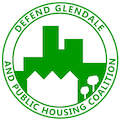Dear Allies: We need your support to submit public comments by this Sunday July 22 to the 2040 Comprehensive Plan to keep public housing public, and to build more public housing in Minneapolis.
Introduction:
Defend Glendale & Public Housing Coalition is a grassroots campaign of residents organizing to prevent the privatization of Glendale & the rest of public housing in Minneapolis. The objective of the campaign is to ensure zero displacement, eliminate systematic gentrification, protect, and build more public housing, and to minimize the racial and economic inequities currently facing Minneapolis and Hennepin County.
Sunday, July 22, less than one week from today, is the final day the City will receive public comments on the draft Minneapolis 2040 Comprehensive Plan. The Comprehensive Plan is meant to guide and provide a framework for city policy for the next twenty years. If approved in its current form, the Comprehensive Plan will do nothing to address the widening racial and income disparities, stop the privatization of public housing, or stop the displacement of low-income communities of color out and the whitening of Minneapolis. There is no mention of public housing whatsoever in the 2040 Plan. This is a deliberate housing crisis created by MPHA and Mayor Jacob Frey along with silent elected officials that support this plan.
Directions To Submitting Comments:
Unfortunately, the City of Minneapolis will only accept written comments submitted through their website. This marginalizes many communities that have no access to computers or do not speak English. This describes the majority of public housing residents, as well as the low-income communities of color, immigrants, and refugees who live in Minneapolis. Therefore, we are asking our allies who do have access to the internet to submit the seven demands listed below to help us meet our goals. Please follow the link below so you can submit these demands as well as your own comments to the 2040 Comprehensive Plan’s website, and share this with your friends and community: https://minneapolis2040.com/comment-form/
Seven Comments to Keep Public Housing Public and to Build More Public Housing in Minneapolis.
- Protect all public housing and build more: Create a permanent-public policy, county, city- wide ordinances, and state bills to protect all public housing units as public housing in Minneapolis and build more public housing. This includes 42 high rises, over 740 homes, Glendale Townhomes, more public housing homes, and over 6,040 current public housing units. Prohibit the sale or lease of land to private developers/investors, or MPHA becoming a private investor, charging market prices for profit through Low-Income Housing Tax Credits, or Land Use Restrictive Agreements, etc. Adhere to the permanent protection land trust Declaration of Trust (DOT).
- Stop the sale and lease of public housing buildings: Public housing properties are currently the first target of conversion by MPHA to private developers, and investors. This includes Glendale Townhomes, Cedar Riverside Public Housing, Elliot Twins, Horn Towers, Friendly Manor, Spring Manor, and Rainbow Terrace to name a few. This also includes public housing buildings in Wards that predominantly house East African Somali and Oromo elders that are the first target, and all public housing properties.
- Stop all methods of privatization by MPHA including Section 8 private ownership conversion that will allow 99.99% of the buildings be turned over to private developers. This would displace residents, who will not be relocated after any/all redevelopment to the properties.
- Stop privatization schemes such as (so-called) “public-private partnerships” for public housing–including HUD’s Rental Assistance Demonstration (RAD) program, Section 18 Demolition/Disposition, “Voluntary Conversion,” removal of public ownership requirements established by Declarations of Trust on public housing properties, etc. These schemes, which MPHA is openly planning for, would permanently transfer ownership to private banks and investors, opening new pathways to rent hikes and displacement.
- Eliminate future displacement: Build more public housing that charges 30% of income for rent for low-income tenants, and stop the privatization of public housing to minimize displacement, homelessness, the housing crisis, social & economic crisis. And, approve Glendale Townhomes’ application for local historical designation at Minneapolis City Council.
- Fund public housing as a public good: Access public funds from the State, County, and City to keep public housing public. Funding for public housing (through the City Levy, County Funds, Affordable Housing fund, etc.) must be added to the City of Minneapolis, County, and State legislative agenda. Public funding to private developers that build temporarily limited-income-based housing for low-income families must be eliminated. Instead, that funding should be used to build more public housing, as well as funding & sustaining public housing, which provides a long-term safety net, and provides social and economic stability to low-income residents of Minneapolis.
- Hold MPHA accountable to fix & repair Glendale Townhomes and Other Properties: MPHA must eliminate its “zero budget” policy for Glendale repairs and maintenance and other properties. This is the only option to preserve Glendale and other properties as they exist now (truly public housing), and to not convert them to any private development, which would permanently displace current residents.
- Income-based definitions of housing affordability, instead of AMI (“area median income”) based definitions: The Comprehensive Plan should establish that housing officially deemed “affordable” must guarantee rents are set according families’ actual ability to pay, at 30% of their income instead of using AMI, which is inflated statistical averages that include rich, mostly White suburbs, and currently allows developers to continually set higher and higher rents while still being considered “affordable housing.”
Please read our full analysis on AMI Here: https://www.dgphc.org/2018/05/10/ami-housing-deeply-unaffordable-for-low-income-families-part-2/ - City oversight of Minneapolis Public Housing Authority (MPHA): The Comprehensive Plan must re-assert the City’s statutory ability to provide public oversight and control of MPHA, and prevent MPHA from acting as a rogue agency bent on the privatization of public housing and spinning itself off into an unaccountable nonprofit that acts in the interests of private investment funding instead of the public good.
Please submit comments 1 to 7 to this link https://minneapolis2040.com/comment-form/
